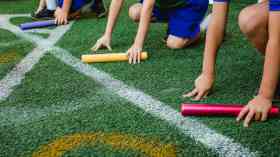Making room for adventure in school lessons
 September 2014 will see the arrival of the new National Curriculum, to be taught in all maintained Primary and Secondary schools across England. The new curriculum provides teachers and schools with the flexibility to develop their own bespoke curricula to meet their students’ requirements. This reflects the government’s ideal that the National Curriculum should not only slim down the level of prescription teaching in the classroom, but also encourage professional decision-making.
September 2014 will see the arrival of the new National Curriculum, to be taught in all maintained Primary and Secondary schools across England. The new curriculum provides teachers and schools with the flexibility to develop their own bespoke curricula to meet their students’ requirements. This reflects the government’s ideal that the National Curriculum should not only slim down the level of prescription teaching in the classroom, but also encourage professional decision-making.
Some view the emphasis on the core subjects as overly prescriptive, and argue that children and young people are not being prepared for life and employment in our modern society. We would certainly have liked to see more focus being put on social development and environmental education in the curriculum changes, for example.
Utilising the outdoors to facilitate learning is still a popular choice, despite the reduction of local authority provision and funding. Many teachers understand the value and positive impact that outdoor learning can have on a young person’s academic performance and personal wellbeing. Mick Waters, QCA’s Director of Curriculum said, “If you want to increase attendance, improve behaviour and raise achievement, get kids out of the classroom.”
Changing attitudes
There are still some who view time outside of the classroom as a one-off activity ‘holiday’ for pupils (a school trip) and, unfortunately, many of those in senior positions in schools mistakenly link time away from the classroom with time not spent learning.
We hope that with a new curriculum comes a new attitude towards adventure learning. As we, and others, get better at evaluating and measuring the impact of what we do, more people will understand that outdoor learning can enrich taught subjects back in the classroom. As we develop our own service provision, and fully integrate it into the philosophy of learning, children will have the opportunity to learn through memorable, first-hand experiences that give depth to curriculum subjects.
The new curriculum offers many opportunities for schools to enhance their current teaching, using tools to develop and stimulate classroom learning. Below are examples of how adventure learning can enrich traditional classroom subjects as part of the new curriculum.
Geography
The new geography programme of study for secondary and primary schools contains a renewed emphasis on ‘Geographical Skills and Fieldwork’. This is particularly focussed on developing practical skills in fieldwork, compass reading and map reading. What better way to improve your pupils understanding of analysing data about geographical features, or unravelling the mysteries of the compass, than by taking them outside to experience this for themselves? By enabling students to understand the application of classroom‑taught subjects in a practical setting, pupils can develop a working geographical knowledge that is relevant to the real world.
Camden Schools for Girls have been using Widehorizons Ty’n y Berth Centre for many years to build upon their geography curriculum, helping to motivate pupils, embed their learning, and improve delivery of their exam syllabus. The main objective of the week-long residential is for students to collect primary data on one of the schools chosen key GCSE exam requirements which could include rivers, sand dunes or forests. They also make learning fun by linking it to exciting and practical adventurous activities. Gary Doyland, geography teacher at Camden School for Girls commented,” The wealth of examples to supplement both the taught curriculum and the excellent locations for practical work means that the centre is a brilliant place for GCSE geographers to come to.”
Fieldwork is a critical element of the GCSE course and pupils’ fieldwork projects for this trip are worth 25 per cent of their GCSE grade. Martin Evans, Head of the Geography Department, commented on the academic impact that the Adventure Learning experience has on his groups, “the wide variety of fieldwork opportunities at the centre mean that it is easy for students to pursue their individual initiatives. The benefits of this are reflected in their high attainment and positive feedback from the examiners”.
History
A key outcome of the updated curriculum has been the focus on historical enquiry skills for pupils, adding ‘it should inspire pupils’ curiosity to know more about the past’. The best way to help children build a natural curiosity, think critically, and begin to evaluate different historical arguments of how the past is interpreted is to help them relive it.
Through adventure learning we can immerse children in the history of people and places through experiential learning and role play. Whilst learning about WWII at an interactive day at Widehorizons Horton Kirby Centre, Claire Hollidge at Crook Lodge Primary stated “children were enthusiastic to share their knowledge and broaden their learning”. Within the new curriculum opportunities to continue teaching the popular unit on the Second World War and this is now also covered within the Local History study option.
Physical Education
With the increase in childhood obesity, and further research in the last decade on the importance of children having more time for Physical Education, this is a key subject in the new curriculum. In March 2014, new studies from JAMA Paediatrics showed that there are “significant positive relationships” between physical activity and academic performance.
Overall, the new programme of study for Physical Education provides a slimmer framework, giving more flexibility to schools in delivering their Physical Education programmes. There is also a focus in the programme of study to ‘take part in outdoor and adventurous activity challenges both individually and within a team’.
So where does adventure learning fit in to this? Learning through adventure is a powerful tool. Why not complete your PE specification by mountain biking, rock climbing or orienteering in the mountains? A typical programme at any residential outdoor education centre will often include a selection of adventurous activities, but those which concentrate navigation and movement skills are also relevant to the areas of assessment.
Ian Mitchell, Director of Excellence at Brownhills School, uses outdoor learning to inspire his students commenting, “What better way to engage your group with their GCSE PE criteria than by taking them mountain biking! The class had a great time whilst developing key physical and mental skills.”
Cross-Curricular Learning
The flexibility of the new curriculum gives schools the opportunity to cover any gaps in pupil’s knowledge and understanding across the whole curriculum. This means there are many options to use Adventure Learning creatively to engage students in areas that otherwise they may have found difficult to comprehend, or for revision sessions.
A particular area that we find is commonly misunderstood is the benefit of teaching, and learning English, maths and science outdoors. These subjects can be learnt in the same experiential way that geography and history can, using inspirational real life examples and the outdoor environment as a vehicle.
Maths
Teaching maths outside of the classroom facilitates kinaesthetic learning. We see many children learning through real life experiences, deepening their understanding of the subject. By taking maths into the outdoors we see clear beneficial outcomes for school groups, including the ability of children to bridge the gap between theory and every day use, driving inquisitive thought processes, a positive attitude to approaching new challenges, and the ability to apply authentic problem solving strategies.
Bridge and Walworth Academies asked Widehorizons to develop mixed activity and GCSE revision weekends for borderline C/D candidates. This has had significant positive impact on their final results. The adventurous activities, combined with the teacher-led revision sessions, developed team skills, confidence and practical problem-solving skills, whilst maintaining motivation and commitment to studying. We are developing a long term plan with the school to build more integrated revision sessions, using the outdoors as a learning tool across Maths, Science and Literacy.
Possibilities
The possibilities for linking adventure learning to the new curriculum are endless, but doing this effectively whilst helping children achieve key learning outcomes is what makes the difference for excellence in teaching.
Further information
www.widehorizons.org.uk
Latest News
27/11/2025 - 11:53
Ofqual has published revised statistics on access arrangements for GCSEs, AS and A levels, alongside new research into the role of time pressure in assessment.
26/11/2025 - 15:22
The announcement follows an earlier pledge of £10 million in funding to provide every primary school in England with a library by 2029.
26/11/2025 - 10:18
The Diets Toolkit recommends that governments introduce more plant-based options in schools, alongside hospitals and other public institutions,
25/11/2025 - 13:05
New data from The Careers & Enterprise Company (CEC) finds that around two-thirds of businesses believe a two-week block of work experience is too time-consuming and offers too little benefit.
25/11/2025 - 12:57
The Youth Sport Trust has launched its latest Class of 2035 Report, warning that unless urgent action is taken to increase physical activity among children, this generation will face poorer health and outcomes.







